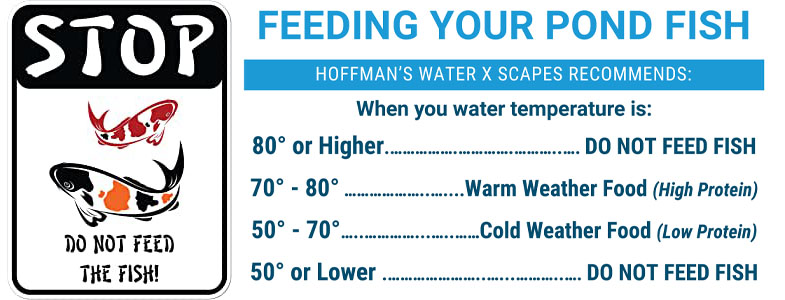How to Keep Pond Fish Alive in Winter
Do Koi Hibernate?
Other common questions that will be answered: How to keep koi fish alive in winter? Feeding Pond Fish in Winter? Should I cover my pond in winter? What to do with pond fish in winter? How do fish survive in a frozen pond during the winter? And more. Contrary to belief…your koi and other pond fish do not hibernate in the winter. What actually happens is their body temperature changes along with the water temperature - affecting their activity levels, metabolism and immune system.
Follow these tips to learn how to keep your pond fish, like koi, healthy throughout the cold winter months:
Do NOT Feed your Pond Fish in Winter
As the weather changes, it is important to keep an eye on your pond thermometer.

- Colder water, below 50 degrees, means that your koi and pond fish are not able to digest the fish food as they normally do in warmer water.
- With pond fish, the food literally goes in one end and out the other. They have no stomach, just a digestive tract.
- As temperatures drop, their metabolism and digestion slow way down. This means that the food slows and could possibly stop in their digestive tract.
- Undigested, processed fish food can cause ulcers in the digestive tract and eventually kill your fish once its metabolism begins to speed up in the spring.
Keep Leaves & Debris Out of your Pond
Decomposing leaves in your pond water can cause many problems. Therefore, it is highly beneficial to net your pond in the fall before leaves start dropping from the trees.
- Leaves can cause havoc on your pond’s water quality, changing the pH and causing colossal algae blooms in the spring - due to the nutrient released from decaying debris.
- As leaves slowly decompose in the colder water, it can invite a fungus that is contagious to your pond fish.
- Leaves and other debris will add to the muck in the bottom of your pond. Too much build up can harbor bad bacteria and parasites that can attack your fish – which, remember, have a lowered immune system during the winter.
- Leaves use up the oxygen in your water as they start to decompose. This can cause your fish to suffocate under the ice, which leads to our next tip…

Keep a Hole Open on the Surface of your Pond Water
This will allow for toxic gasses to escape, which comes from fish waste and decomposing plant debris.
- Using a pond deicer (pond heater) will keep a small opening on the pond’s surface. Most are even thermostatically controlled, which means they turn on and off as needed as the temps change.
- Pond aeration systems help to put oxygen back into your pond water under the ice. It also helps keep the surface open. During the winter the air stone should be suspended at approximately half the depth of the pond, under the de-icer.
- Experience has shown that a pond aerator is a must in ponds when your koi or pond fish are larger than 6-8” long.
- Although fountains and waterfalls do keep a hole open, it does lower the water temperature at the bottom of your pond, which is kept warmer from the ground underneath. This also lowers your fish’s body temperature.

Do NOT Break the Ice!
In the event that there is power loss to your pond and it freezes over solid, it is very important not to strike the ice to break it.
- Force to the ice sends shock waves into the water that can cause a concussion or death to your fish. The bigger the fish, the more susceptible they are.
- Try using a hair dryer or heat gun to get through the ice.
- We have also had success with pouring hot water over the ice to melt it or setting a pot of boiling water on the ice until it melts an opening.
- Don’t panic! The surface can actually freeze over for a little while before any adverse reactions start... as long as there are minimal leaves and debris in the bottom of your pond.
Beneficial Cold-Water Treatments
No one really wants to go out to their pond in the cold winter months, but the benefits of adding beneficial bacteria and enzymes through the winter will pay off when it comes to opening your pond in the spring.
- Pond Basics Fall & Spring Pond Treatment will continue to help break down fish waste and debris in your pond… even in cold water.
- Add liquid enzymes and powdered bacteria once a month through the hole that is kept open on the surface, but be careful not to slip or fall in.
- As the water temperature starts to increase in the spring, the process speeds up. Waste in your pond water is converted to complex plant nutrients that your pond plants, which are coming out of dormancy, begin to use right away.
- Less string algae and algae blooms (green water) will occur when everything thaws and the pond is flooded with oxygen again, if you are consistent with adding beneficial bacteria.
- Consider it a jump start to the season.
In Summary:
- Don’t believe your koi and pond fish if they tell you they are starving… it will do more harm than good to feed them in the cold winter months.
- Keep your pond clean - with minimal leaves and debris in the bottom of your pond.
- Allow toxic gasses to escape and oxygen to return by keeping a hole open on the surface and keeping your pond aerator running.
- Be gentle and do not panic if your pond freezes over.
- Using a beneficial bacteria for pond health through the winter will jump start your next pond season.
